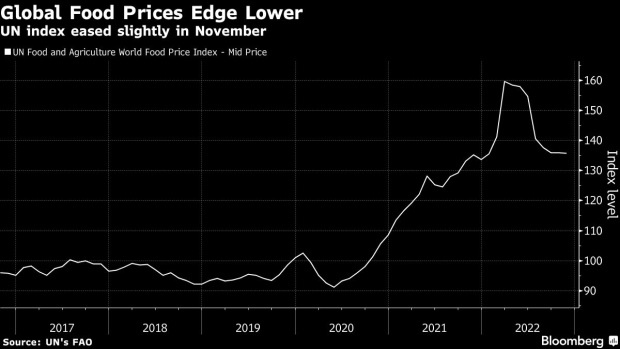Dec 2, 2022
Food Prices Decline for Eighth Month Easing Inflation Pressures
, Bloomberg News

(Bloomberg) -- Global food prices fell for an eighth month in November, in a sign that inflationary pressures may be easing.
A United Nations gauge of food prices declined 0.1% last month to the lowest since January. The renewal of Ukraine’s grain-export deal sent wheat and corn prices tumbling, while the threat of a global recession is curbing food demand.
Rising food prices have been a major contributor to a broader inflationary spiral that’s fueling a cost-of-living crisis in countries from the UK to Malaysia. Investors and economists are watching closely for signs that inflation has peaked, allowing central banks to slow the pace of monetary tightening.
Food inflation spiked this year after Russia’s invasion of Ukraine, hitting a record in March as a blockade of Black Sea ports hobbled exports of key staples. While shipments from Ukraine resumed in July, prices remain much higher than usual for this time of year. That’s fueling the worst global food shock in more than a decade, according to the International Monetary Fund.
The continued decline may offer some relief to households, but it can take time for commodity price shifts to trickle through to grocery-store shelves. The UN index tracks export prices for raw goods and excludes retail mark-ups.
Obstacles also remain to getting Ukraine’s grain out despite the extension of the deal, and elsewhere high energy prices are pushing some food companies to cut staff.
©2022 Bloomberg L.P.






